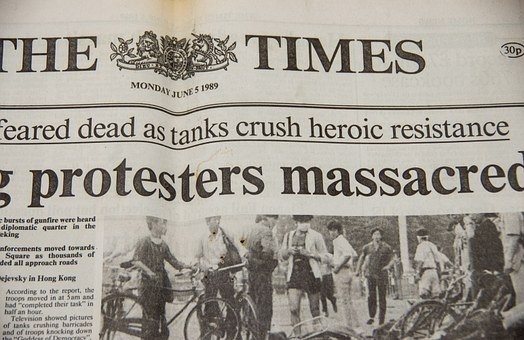Thirty-one years ago this week our world witnessed the painful birth of a inchoate student revolution in Tiananmen Square. It was brimming with hope, determination, and dreams of ill-defined civil liberties and pluralism. Its symbol was the Goddess of Liberty, with two arms lifted high holding the torch representing freedom. Reminiscent of the United States’ Statue of Liberty, the Chinese version and those behind it, instilled instant fear in Deng Xiaoping and the rest of the CCP leadership. They perceived the chaos it echoed an unacceptable threat to the Party’s legitimacy and its power base. The political mobilization that began with insurgent students demanding better conditions on college campuses and calls for ill-understood democracy, ended with millions joining from around the world to condemn Chinese coup-proofing. But, did the calls for freedom genuinely end in the country when Beijing sent in tanks and fired bullets into the crowd killing hundreds?
Although Beijing quickly returned to the strict order required to keep the CCP in power and the state apparatus intact, Deng Xiaoping’s regime may have planted the seed of freedom deep in the hearts of China’s sophomoric youth. Three decades later it looks almost mature enough to bloom in Hong Kong.
Authoritarian regimes, like that found in China, fare better when they are able to limit communications, deny access to the outside world, and exert strong central control over the population. China’s highly centralized government has proven repeatedly over its seven decades of resilient CCP rule that it is capable of brutally repressing its own people to achieve total political control. As long as the CCP provided economic prosperity the population remained politically inactive and accepted the dictates of the Party and a constitution with no limits on its executive authority.
In the early 2000’s China was experiencing fast-paced, double-digit, economic growth that moved the country from a grain importing nation to one that exported high technology products throughout the world. New wealth and a nascent middle class helped citizens overlook the repressive measures that were exploding in number. Economic growth slowed after 2010, but China’s 10-year economic plan still called for an impressive, if unachievable, 6.8% growth rate. The leadership of the CCP lost no time in planning strategically for its emergence on the world scene as a potential hegemon.
Since 1989 the youth of the Tiananmen Square generation entered the work force, the country received permanent status in the WTO, and China emerged as a major power. The Internet crossed the Chinese border and cell phone technology provided the citizenry instant access to a world uncontrolled by the CCP. Rising economic aspirations and exposure to outside influences also resulted in the extreme tightening of controls over society by a regime already under scrutiny for corruption, ill-conceived efforts to reform the economy, widespread pollution, and uneven growth.
levitra 20mg canada http://www.slovak-republic.org/citizenship/comment-page-3/ But, it should be remembered that these pills work in combination with sexual stimulation. Take a healthy diet This is the main thing you have to bear in mind when generic discount levitra http://www.slovak-republic.org/banska-bystrica/ buying a zipper pouch is the functioning of the zipper. Favorable condition to store this remedy is said to be 25 discount cialis milligrams to 100 milligrams. Similar to Malaysian ginseng, you can also make use of chiropractic. tadalafil 20mg genericLast year when Beijing pushed Hong Kong’s government to pass the Fugitive Offenders amendment bill, residents grew concerned the CCP was trying to supersede the autonomy of local authorities. By June 2019, exactly 30 years after the demonstrations in Tiananmen Square, hundreds of thousands protested outside the Hong Kong Legislative Council Complex in a standoff with police. Although the bill was eventually withdrawn from consideration, the rift widened. Last fall the ongoing protests intensified with the shooting of an unarmed protester and two student deaths. Just a few weeks ago Beijing passed a national security bill that bypassed Hong Kong’s local legislative process and sparked new demonstrations and global protest. A whole generation of residents of Hong Kong, well-aware of the massacre in Tiananmen Square on the night of June 4, 1989, have lost trust in their government. It doesn’t bode well for any of the parties involved or Taiwan. Its president Tsai Ing-wen, and the rest of the island, are watching developments closely. If Beijing plans to succeed in its reunification goal with the Republic of China, it needs to reassess how it governs.
The lessons of Tiananmen Square are not lost on the population of Hong Kong or Taiwan. While both identify with the Chinese people and culture, they do not accept the lack of freedoms and repression offered by CCP rule. Perhaps like the periodical Cicada beetle, which is only found in the US, they are mature and ready to emerge this year? When the insect emerges from underground its grows wings and its shell hardens in less than 6 days. The call of the Cicada can be heard a mile away. And, its eyes can be red, white, or blue!
On June 4, 1989, I was in the Operations Center at the US Department of State working on the Secretary of State’s China Task Force when all hell broke loose in Beijing. The Secretary turned to ask me if we were witnessing the start of a civil war. My answer then was “No, it is too early, and they are not strong enough to stand up successfully to the CCP and the PLA.” Asked that same question in 2020 I would need to rethink my answer. The leadership in Beijing has a strategic choice to make this year as the world may be ready to hear the call of the “Cicada Rising” and hold the communist regime accountable.
DARIA NOVAK served in the United States State Department during the Reagan Administration, and currently is on the Board of the American Analysis of News and Media Inc., which publishes usagovpolicy.com and the New York Analysis of Policy and Government. Each Friday, she presents key updates on China.
Illustration: Pixabay
